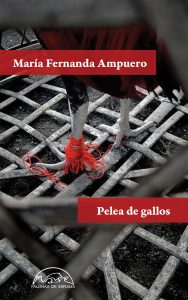

The haunting effect can be unsettling and enabling at the same time.

Many of these texts wrestle with Canada’s colonial past and with the voices and histories that were repressed in the push for national consolidation but emerge now as uncanny reminders of that contentious history.
.png)
The essays gathered here range from treatments of early postcolonial gothic expression in Canadian literature to attempts to define a Canadian postcolonial gothic mode. Unsettled Remains: Canadian Literature and the Postcolonial Gothic examines how Canadian writers have combined a postcolonial awareness with gothic metaphors of monstrosity and haunting in their response to Canadian history.

These writings could be read as poetical and political strategies of dissent that innovate within the genre of speculative fiction. We will try to examine a range of subversive metamorphoses of the female body in recent speculative fiction by Cecilia Eudave, Socorro Venegas, Mariana Enríquez, Samanta Schweblin, Valeria Correa-Fiz, Florencia del Campo, Agustina Bazterrica or María Fernanda Ampuero. This essay tries to analyse these speculative narratives which we will call hemispheric and which bear some resemblance from the north to the south of the continent, for different political and traumatic reasons, focusing especially on their cinematic deployment of the HomeSpace horror, childhood memories and physical and psychological boundaries which chain us to our ancestors’ memories. An important group of unusual creatures in the contemporary fiction of Latin American women authors seem to «crawl out of their skins» (Himani Bannerji). It is as important as ever to be vigilant to ensure "that what has been won is not lost," Trias added.This paper interprets the way in which transnational writers use monstrosity and the uncanny to investigate the concept of the HomeSpace with dissent. "To think that at this moment we are on an equal footing is a bit naive," she said. Striking a note of optimism, Nettel underlined that in 2014 she was only the third woman in 30 years to win the Herralde award - and since then, three others have received it.Īlthough there are steps in the right direction, Trias warned that "the fight is not won in the least." We denounce it and turn it into a challenge," she said. Pacheco regrets that in Peru there are not as many reviews of women's work as in Argentina or Spain.īut "I'm not going to cry about this inequality. The extent of progress is also uneven depending on the country. "Everything that women produce is positioned as if it were female literature," while male literature is just literature, says Brazilian writer Djamila Ribeiro / ©ĭespite the changes, discrimination persists insofar as "everything that women produce is positioned as if it were female literature," and male literature is just literature, said Brazilian writer Djamila Ribeiro, 41.


 0 kommentar(er)
0 kommentar(er)
